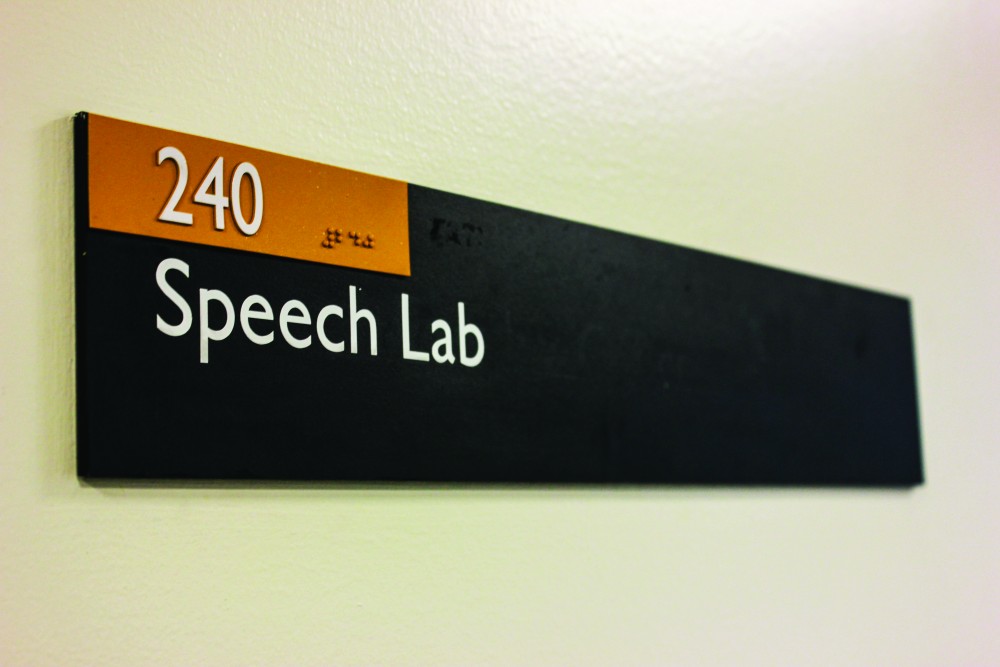Speech Labs help student presentations

GVL / Kaitlyn Bowman The new GVSU speech lab on campus.
Aug 29, 2012
From English majors aspiring to lead academic lectures to future doctors looking to communicate with patients, the ability to speak effectively is unarguably important.
“Forbes just released this list that says that of the top five skills that they want undergraduates to be trained in, the ability to speak in public is one of them, and they think it’s the skill that students are least prepared for,” said Danielle Leek, professor of communications at Grand Valley State University.
With a perceived need for speech resources, Leek worked to survey over 500 undergraduates at GVSU to evaluate their strengths, weaknesses and speech habits. The result led her, with support from the School of Communications and Dean of the College of Liberal Arts and Sciences, to develop the much-needed Speech Lab to help students develop skills that make them more employable.
“Grand Valley is really behind the trend on this,” Leek said. “Speaking centers have existed—they’re oftentimes called communications centers—and they exist on campuses all over the country, and they’ve really been operational since about the 1970s with a real increase in the number of communication centers in the 1990s and 2000s. We are actually one of the largest public universities to not have a resource like this on campus. So it was time. It was really well passed time for us to do something like this.”
Two student directors run the Speech Lab and supervise a trained staff of all undergraduate tutors. Each tutor has successfully completed the Communications 201 speech class and extensive additional training that requires them to learn advanced public speaking techniques, as well as effective ways to mentor and coach other students with speaking.
Senior Bridgett Vanderhoof, who worked as a speech tutor during the pilot phase of the project and is now one of the student directors of the Speech Lab, said one of the biggest challenges so far is diagnosing each client’s needs and which stage of the speech-making process can be improved.
Another difficulty is assisting clients with performance anxiety and helping people gain confidence in speaking with a group. Despite these challenges, though, Vanderhoof said she saw visible improvements in the clients she has helped so far.
Students seeking assistance from the lab can receive tutoring with writing, delivery or both.
Those looking to polish delivery techniques can rehearse in front of a tutor, or record a practiced version of the speech and then watch a video of it to determine where improvements can be made.
Leek said the Speech Lab—which is not meant to improve speech impediments but methods for speech writing and delivery—is not as large as the Writing Center, but is fashioned in a similar model in that students can make appointments to meet individually with tutors.
Students need not have a class assignment to use the Speech Lab.
“Our tutors are trained to help people with wedding toasts, we’re trained to help people with giving an award presentation, accepting an award, religious services, speaking in front of a student organization like a fraternity or sorority, any one of those kind of speeches,” Leek said.
The professor said many other institutions offer help with interpersonal communication, interviews, negotiations, conflict resolution and workplace communication, but GVSU only offers speech assistance at present time. Leek does look to add these additional services in the future, though.
In fact, Leek foresees much growth from the project in the future.
Now centralized in 240 Lake Superior Hall, the Speech Lab may expand within the next few years to include resources in living centers or the new library.
Also, while presently available to undergraduates only, Leek said she hopes to open the resource to a broader population at a later date.
“We want to make sure that we’re really good at what we do first before we add additional services, so right now we have undergraduate tutors tutoring undergraduate students, and our hope is that in the future we expand to graduate students, that we could become a resource for faculty [and] improve their speaking skills, and also as a resource for the community,” Leek said.
With Vanderhoof and three other student tutors, Leek led a small pilot project in winter 2012 to critique a few classes in which students delivered speeches. After a successful first semester, the group worked with some Communications 201 classes over the summer as well as some McNair Scholars. Now, the resource is available to all undergraduate students.
Since its inception, the Speech Lab has helped most of its clients improve their grades on speech assignments.
“It has definitely been as valuable as we thought it was going to be, so we can show statistically that students who come and practice their speech in the Speech Lab do better on their speech assignments in terms of grade than students who don’t,” Leek said. “Students in the spring and summer sections of COM 201 (Speech) were asked to go to the Speech Lab as part of their course assignments. Of the 45 students represented, those that visited the speech lab at least 2 times to get help on their speech assignments averaged a total of 11 points higher on their total speech grades than those that did not.”
Sessions take about 25 minutes and are scheduled by appointment only, but students can request a same-day meeting. The lab is open Monday through Thursday with occasional Friday and weekend hours, and it will also host a few drop-in clinics in living centers during the year.
To schedule an appointment with a tutor at the Speech Lab, visit the website at http://gvsu.edu/speechlab/.

























